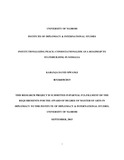| dc.description.abstract | This study explores how to institutionalize peace in Somalia. It analyzes the various peace efforts that have been initiated by the international community since the fall of the government of Siad Barre in 1991 and identified their shortcomings. It thus intends to answer the following questions: Why has it been so difficulty to institute an official government that exercises authority over the whole Somalia? Why has past peace initiatives not worked? How can lasting peace be institutionalized in Somalia? How has the international community‗s influenced the architecture of post-conflict state reconstruction in Somalia? The study uses the consociationalism theoretical framework and argues that stability can be reached in divided societies through the adoption, development and institutionalization of a power-sharing model which aims at taming and restructuring intrinsic fault lines. It further posits that consociationalist principles often provide minority groups with considerable autonomy and it departs from other forms of decentralization by ensuring representation along non-territory specific lines, where minority groups are guaranteed representation in government regardless of territorial cohesion. The study tests these hypotheses using qualitative method, especially structured focused comparison and process tracing using Somalia as the case study. The findings support the theoretical argument.
. | en_US |

